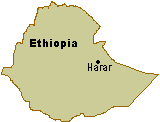All my life language arts and English have been the most difficult subjects for me, and in class I’d always been the one student behind everyone else. At home, my mother only spoke to me in Harari, a small native Ethiopian language. I was first introduced to English in kindergarten and immediately struggled with it. And in elementary school, I mispronounced many words when reading and was made fun of for my accent. I had difficulty trying to connect English with Harari because the grammar and syntax between the two are very different. I continued to have a hard time with writing as well, and it felt futile learning about verbs, tenses and parts of speech when none of it made sense to me.
However, I think the biggest factor in my difficulty with English was my total lack of interest in the subject. My mother used to always tell me how important it was to hold onto Harari. Even in her home city of Harar, where the language originated, the Harari people are the minority and the language is projected to die out within the next hundred years, a situation comparable to Native American languages in the United States. With a language as widespread as English, something spoken by most people even in Ethiopia, I didn’t think learning the language served any cultural purpose and resented the amount of time I had to spend refining it.

A major attribute to my success in learning English and accepting it as a class was the solace I found in reading books. I used to dread reading, and I only enjoyed picture books like The Cat in the Hat and Corduroy. Reading eventually became easier to me because I related to the themes shared in them. I read my own story being told in books like Lupita Mañana and Tears of a Tiger, which told of overcoming the struggles of being minorities and children of immigrants in the U.S. In high school, I took the leap of taking AP English Literature, where I read The Importance of being Earnest and gained a deeper appreciation of the language. Another reason I have accepted English despite it not being Harari, is how important it is to communicate with people from all over the world and seeing it as the universal language that it is. My experience in Ethiopia led to this change. When I lived there I found that a lot of people receiving a public and private education spoke English. This was something I didn’t expect. These people are merely trying to catch up to the modern world where everyone can communicate and exchange their knowledge. While I still have trouble with grammar and writing, it’s becoming easier for me now that I realize its importance.